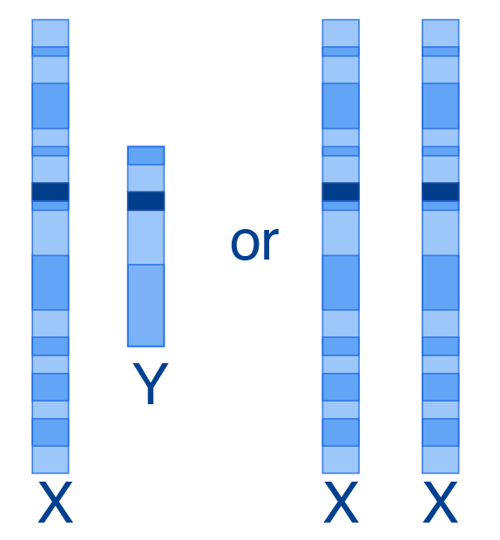
What are the chances a child will end up with Fragile X if mom has a premutation?
May 7, 2018

- Related Topics:
- X linked inheritance,
- Medical genetics,
- Carrier
A curious adult from the US asks:
"What are the chances that a child will end up with fragile x if mom is a fragile x carrier with 63 cgg repeat and 1 agg interruption?"
Tricky question! Fragile X is a very complicated genetic condition. In short, in this case, the chance of having a male child with Fragile X may be somewhere between 5-19%, and a female child with Fragile X is much, much, much lower.
This is a great thing to talk to a doctor or genetic counselor about! They’ll be able to help someone understand their personal risk, and what that might mean for their family.
But let’s dig deeper into this.
Fragile X syndrome is a medical condition that causes intellectual disability. This means that people who have Fragile X syndrome may have more trouble learning in school and may be in special education classrooms. But this really depends on the person, just like intelligence in anyone is different from person to person.
Again, Fragile X is really complicated. To understand Fragile X, first you have to know a little about chromosomes.
Chromosomes are like libraries for our genes.
We have thousands of genes that instruct our bodies on how they should develop, determining things like hair color, eye color, and body parts. These genes are organized into chunks called chromosomes.
The X chromosome is one of two sex chromosomes. Sex chromosomes help determine whether someone has the reproductive body parts of a boy or a girl. Typically, girls have two X chromosomes, and boys have an X and a Y chromosome.

Chromosomes are passed down from generation to generation. One set comes from the egg, and one set comes from the sperm.
Women (who have 2 X chromosomes) always pass down an X to their children.
Men (who have an X and a Y) either pass down the X or the Y to their kids. If the dad passes the X chromosome down, the child will be female, and a Y, the child will be male! The sex of a baby is determined by the dad’s chromosomes, since the mom passes an X down.

There is one gene that is responsible for Fragile X syndrome, called FMR1. This gene is on the X chromosome. Usually this gene helps to make an important protein that helps with brain development.
People with Fragile X syndrome inherit a version of FMR1 that does not work. People with Fragile X do not make the protein correctly. This lack of protein causes the condition.
But why doesn’t the gene work in some people?
The FMRI gene has a pattern called CGG repeats. In a typical FMR1 gene, there are less than 45 CGG repeats. When there are over 200 repeats, the FMR1 gene shuts down and does not work. So people with more than 200 CGG repeats have Fragile X syndrome.
Boys with the full mutation will have Fragile X syndrome. Since they only have one copy of the X chromosome, they only need one full mutation to have Fragile X.
Usually girls do not have the condition, even with the full mutation. This is because girls have 2 X chromosomes. Even though one of the genes is not working, she still has another on the other X that works and makes the protein. But some girls who have a full mutation may have difficulties learning or socializing.

Repeats of DNA can expand
These repeats are unstable. This means that the number of repeats can change between a parent and a child! Sometimes the number of repeats will expand, and a child will end up with more repeats than their parents. The more repeats a person has, the more likely it is to expand. People with 45-54 CGG repeats have an intermediate form of the gene, but this does not cause Fragile X syndrome.
When there are 55-200 CGG repeats, someone has a “premutation” which means that their FMR1 is not stable. This could expand to more repeats and could cause Fragile X syndrome in their children or grandchildren.
The chance of the premutation expanding to the size of a full mutation is related to how big the premutation is. The larger the CGG repeat number, the higher the chance it will expand to a full mutation.
The premutation is more likely to expand when it is passed on by a woman. A woman with a premutation often passes down a larger amount of repeats on to her children. But since typically only one of her X chromosomes has the premutation, she only has a 50% chance of passing it on to her kids.
When a father passes down a premutation to a daughter, it does not usually expand to a full mutation and cause Fragile X syndrome. A father cannot pass down the premutation to his sons, since he only passes his Y chromosome to them (remember, the Fragile X gene is on the X chromosome!).
If a woman has a premutation and it is passed on to her kids, it can remain a premutation or it can expand to a full mutation. If she has a full mutation and it is passed on, it will remain a full mutation. The chances that it will expand all depend on how many CGG repeats the person has.
But why do the repeats expand?
Now this is where it gets REALLY complicated. When there are an unstable amounts of repeats, the DNA has trouble copying when it makes new cells. When there are lots of repeats, the DNA may make loops which expand the new DNA.
If you want to read more, the term to look up would be “replication slippage” or “trinucleotide repeat expansion”.

Author: Kim Zayhowski
When this answer was published in 2018, Kim was a student in the Stanford MS Program in Human Genetics and Genetic Counseling. She wrote this answer while participating in the Stanford at The Tech program.
 Skip Navigation
Skip Navigation
